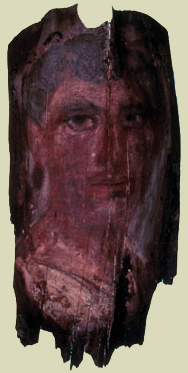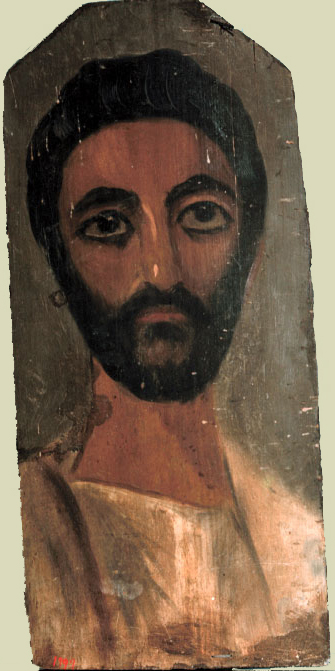Age
Cavafy’s poetry brings to life aging personae who are troubled by the changes time brings. Their thoughts center on their bodies’ deformation, the loss of beauty, loneliness, and death. Against the force of time, art is an antidote that aids in the recovery of beauty and the seduction of younger readers.
Portrait of a middle-aged man
Encaustic on wood
Roman, Flavian (AD 69–138)
Kelsey Museum 26803
 |
|
Melancholy of Jason Kleander,
Poet in Kommagini, AD 595
The aging of my body and my beauty
is a wound from a merciless knife.
I’m not resigned to it at all.
I turn to you, Art of Poetry,
because you have a kind of knowledge about drugs:
attempts to numb the pain, in Imagination and Language.
It is a wound from a merciless knife.
Bring your drugs, Art of Poetry—
they numb the wound at least for a little while.
Trans. Edmund Keeley and Philip Sherrard
|
|
|
Tomb of Lanis
The Lanis you loved, Markos, isn’t here
in this tomb you come to weep by, lingering hours on end.
The Lanis you loved is closer to you
when you’re in your room at home and you look at his portrait—
the portrait that still keeps something of what was valuable in him,
something of what it was you used to love.
Remember, Markos, that time you brought in
the famous Kyrenian painter from the Proconsul’s palace?
What artistic subtlety he used trying to persuade you both,
the minute he saw your friend,
that he absolutely must do him as Hyacinth.
In that way his portrait would come to be better known.
But your Lanis didn’t hire out his beauty like that:
reacting strongly, he told him to portray
neither Hyacinth nor anyone else,
but Lanis, son of Rametichos, an Alexandrian.
Trans. Edmund Keeley and Philip Sherrard
|
|
|
Modern Fayum portrait
Paint on wood
Kelsey Museum 1797
 |
|
|
|